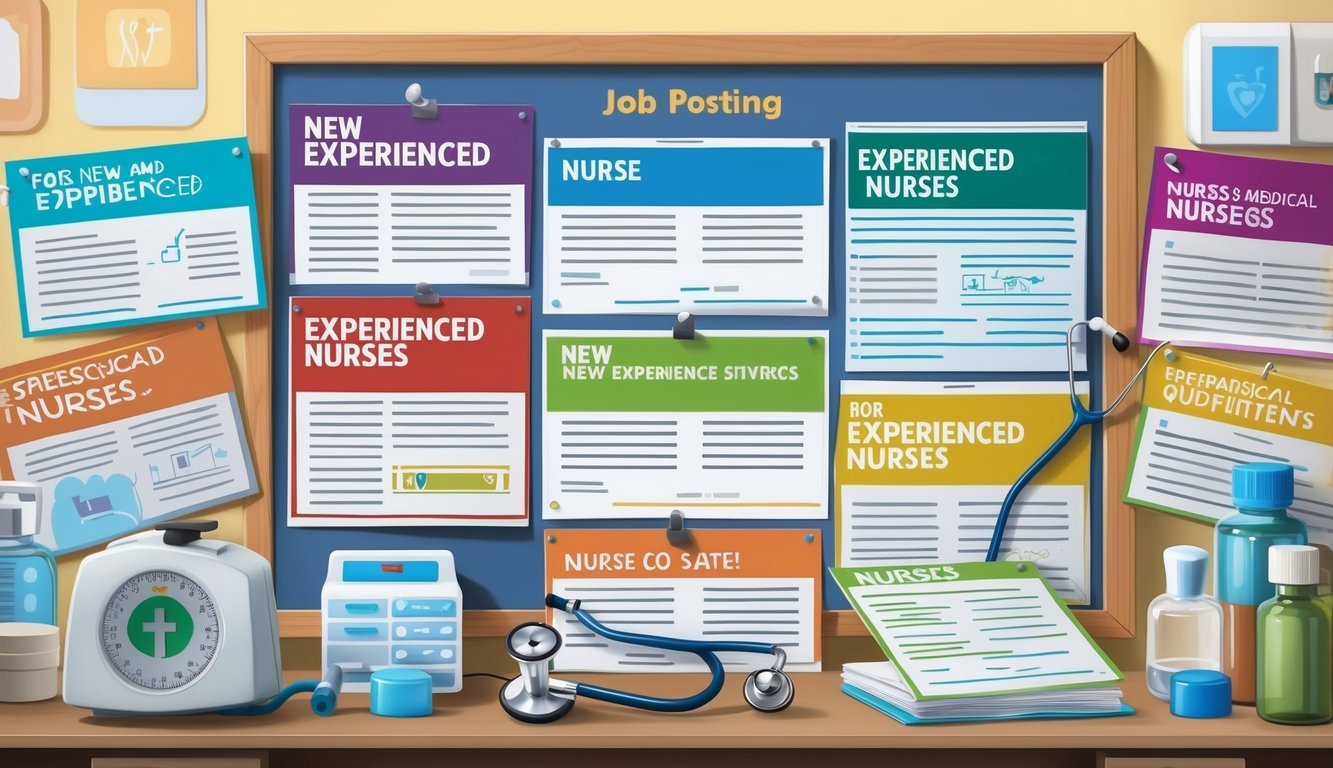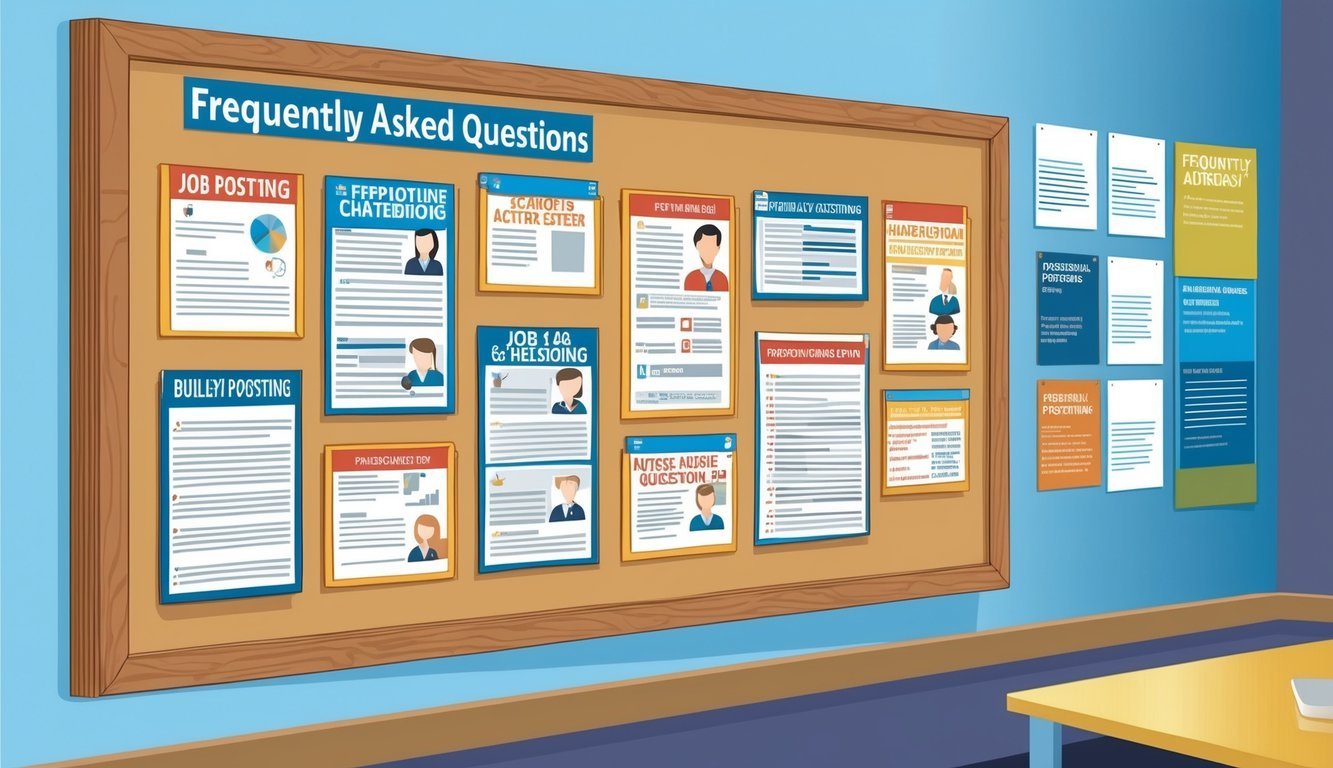Finding a new nursing position can be daunting, especially with so many options available. RN job postings are plentiful and can vary greatly in requirements, locations, and specialties. Understanding how to navigate these listings can help you find the right fit for your career goals.
As you explore job postings, consider what aspects of nursing interest you most.
Whether you seek a role in a hospital, a remote position, or a specialty area, knowing where to look can save you time and effort.
The world of nursing offers diverse avenues for both new and experienced professionals, so it’s essential to have a clear strategy.
Stay informed about trends in the nursing field to enhance your job search.
Exploring resources like Indeed and Nurse.com will provide a wealth of opportunities.
Having the right information at your fingertips will empower you during your job search and application process.
Key Takeaways
- Understand the variety of nursing job postings available.
- Know where to find reliable resources for job listings.
- Stay updated on nursing trends to enhance your job search.
Understanding the Nursing Profession

The nursing profession is both rewarding and challenging.
It offers various roles and opportunities for growth and specialization.
As a registered nurse (RN), you will be at the forefront of patient care and can engage in ongoing professional development.
Registered Nurse Responsibilities
As a registered nurse, your primary responsibilities include assessing patient needs, developing care plans, and implementing treatments.
You will work with patients who have various illnesses, injuries, and conditions.
Tasks may include:
- Monitoring vital signs
- Administering medications
- Educating patients on health management
Collaboration is key in nursing.
You will often work alongside doctors, specialists, and other healthcare professionals to ensure comprehensive care.
Additionally, maintaining patient records and following up on treatment progress are vital parts of your role.
Nurse Residency Programs and Professional Development
Nurse residency programs are designed for new graduates to bridge the gap between education and practice.
These programs typically last around 12 months and provide valuable clinical experience.
They may include:
- Preceptorship: Working with an experienced nurse mentor
- Workshops: Focusing on clinical skills and critical thinking
- Feedback: Regular evaluations for personal growth
Engaging in professional development opportunities, such as advanced certifications or specialized training, can enhance your nursing career.
Ongoing learning promotes skill improvement and prepares you for leadership roles.
Specialties within Nursing
Nursing offers numerous specialties, allowing you to focus on areas that interest you.
Some popular nursing specialties include:
| Specialty | Description |
|---|---|
| Pediatric Nursing | Working with children and their families. |
| Critical Care Nursing | Caring for patients in intensive care settings. |
| Wound Care Nursing | Focusing on the assessment and treatment of wounds. |
Each specialty requires different skills and knowledge, which can make your career diverse and fulfilling.
Specializing can lead to higher salaries and more job opportunities.
Exploring various fields allows you to find your passion in nursing.
For more information on nursing careers, consider visiting resources like Nursing World or Nurse Journal.
Navigating Nursing Job Postings
Finding the right nursing job requires careful consideration of various factors.
You need to focus on identifying trustworthy job listings and understanding the specific requirements each role demands.
This approach will help you make informed decisions in your job search.
Identifying Reputable Job Listings
When searching for nursing positions, select job boards that are known for quality listings.
Reputable sites typically include those maintained by industry organizations, such as the American Nurses Association or specialized nursing job boards.
Look for listings that feature:
- Company Information: Ensure the employer is well-established.
- Clear Job Descriptions: This gives insight into daily tasks.
- Licensing Notes: Verify they match your credentials.
Check reviews on platforms like Glassdoor to assess workplaces before applying.
This helps you avoid potential pitfalls and connect with employers committed to hiring qualified nurses.
Understanding Job Requirements
Every nursing position has unique requirements.
Carefully review each job posting to understand what is expected.
Key areas to focus on include:
- Licensing: Confirm your state license aligns with job demands.
- Clinical Knowledge: Make sure your specialty fits the role.
- Preferences: Some positions may ask for specific experience levels.
Read through the qualifications section thoroughly.
If certain skills or certifications are required, consider pursuing any additional training.
Highlight your relevant experiences in your application to stand out from other candidates.
The Application Process for RNs

Navigating the application process for registered nurse positions involves essential steps.
Focusing on crafting a professional resume and presenting your skillset can set you apart as a qualified candidate.
Crafting a Professional Resume
Your resume is often the first impression employers will have of you.
It should clearly highlight your education, certifications, and relevant experience in the nursing field.
- Contact Information: Include your name, phone number, and email at the top.
- Objective Statement: Write a brief statement that reflects your passion for patient care.
- Education: List your nursing degree and any relevant certifications, such as CPR or ACLS.
- Experience: Detail your nursing positions, internships, or volunteer work. Use bullet points to describe your specific duties and achievements.
- Skills: Emphasize both hard and soft skills, like patient assessment, communication, and teamwork.
Ensure your resume is clear and free of errors.
Tailor it to each job you apply for by incorporating keywords from the job posting.
For more tips, visit Nurse.org.
Presenting Your Skillset and Experiences
When applying for RN positions, it’s vital to showcase your skills effectively.
Highlighting your abilities ensures you attract the attention of hiring managers.
- Identify Your Strengths: Think about what you excel at in patient care. This could include critical thinking, technical skills, or compassion.
- Use Specific Examples: Share instances where you made a positive impact on patient outcomes. For example, describe a situation where you improved care processes.
- Customize Your Approach: Align your skills with the specific requirements of each job. If a position emphasizes teamwork, detail your collaborative experiences.
- Prepare for Interviews: Be ready to discuss your resume in detail. Practice answering questions about your skills and how they relate to the job.
Being specific about your qualifications can greatly increase your chances of getting noticed.
Check out RegisteredNursing.org for further resources on job searching in nursing.
Considerations for New and Experienced Nurses

When exploring job postings, it’s important to understand the specific opportunities available for new graduate nurses and ways to advance your nursing career.
Both aspects can significantly influence your professional development and job satisfaction.
Job Opportunities for New Graduate Nurses
As a new graduate nurse, you may find various entry-level positions to kickstart your career.
Common roles include working in hospital settings, nursing homes, or outpatient clinics.
Many facilities offer nurse residency programs that provide mentorship and support.
| Job Types | Key Features |
|---|---|
| Staff Nurse | Direct patient care, often in multiple units |
| Case Management | Overseeing patient care plans and coordination |
| School Nurse | Focusing on student health and education |
These roles often come with competitive pay.
Understand the pay scale in your region by researching local job postings.
This knowledge helps you negotiate effectively when you receive an offer.
Advancing Your Nursing Career
To advance your nursing career, consider pursuing specialized certifications or advanced degrees.
This can lead to opportunities in case management and other areas, enhancing your ability to provide quality nursing care.
Professional development is crucial.
Engage in workshops and continuing education programs to stay current with industry practices.
Networking with other professionals can also open doors to new opportunities.
Investing in your career not only improves your skills but can lead to higher-paying roles.
Always seek positions that align with your long-term goals, as this ensures a fulfilling nursing career.
Remote Nursing and the Future of Healthcare
The healthcare landscape is changing with the rise of remote nursing roles.
As technology improves, new opportunities arise for patient care and the role of nurse practitioners continues to expand.
Remote Patient Care Opportunities
Remote patient care offers a range of services, allowing nurses to provide care from home.
You can engage with patients through telehealth platforms, monitor vital signs, and manage chronic conditions.
Common remote roles include:
- Telehealth Nurse: Assists patients over video calls.
- Triage Nurse: Evaluates patient conditions and advises on care.
- Health Coach: Guides patients on wellness and healthy habits.
These positions require good communication skills and technical proficiency.
They not only help meet healthcare demands but also promote work-life balance.
For more information about remote nursing jobs, visit Nurse.org.
The Growing Role of Nurse Practitioners
Nurse practitioners (NPs) are crucial to expanding access to healthcare.
You can provide primary care, diagnose conditions, and develop treatment plans.
This flexibility allows you to take on roles traditionally held by physicians.
As healthcare demands rise, NPs are filling gaps in underserved areas.
They can work in various settings, including telehealth, private clinics, and hospitals.
Increased responsibilities require NPs to pursue advanced education and training, ensuring patient needs are met efficiently.
Nationally, the average salary for an NP is around $120,000, reflecting the high demand for their skills and expertise.
For a list of remote job openings for nurse practitioners, check Indeed.
Frequently Asked Questions

When searching for RN job postings, several specific questions often arise.
Understanding qualifications, finding remote opportunities, and recognizing the highest paying specializations are key factors for job seekers.
Below are some common inquiries and answers concerning these topics.
What qualifications are required for an RN position in a government sector?
To work as a registered nurse in the government sector, you generally need a valid RN license, which requires completing an accredited nursing program.
Many positions also require certifications in specific areas, such as Basic Life Support (BLS) or Advanced Cardiovascular Life Support (ACLS).
Additionally, some roles may prefer candidates with experience in public health or government nursing.
How can I find remote RN job opportunities?
Finding remote RN positions is easy through numerous job boards and nursing-specific websites.
Websites like Nurse.com and Indeed allow you to filter for remote roles.
Networking on professional platforms, such as LinkedIn, can also lead to opportunities that may not be widely advertised.
What are the highest paying specializations in the nursing field?
Certain nursing specializations tend to offer higher salaries.
Here are some of the top-paying fields:
| Specialization | Average Salary |
|---|---|
| Nurse Anesthetists | $165,000 |
| Nurse Practitioners | $115,000 |
| Clinical Nurse Specialists | $105,000 |
| Nurse Midwives | $105,000 |
How can I locate RN job openings in my vicinity?
You can find local RN job openings through several methods.
Start by checking local hospital websites or healthcare systems in your area.
Job boards like Glassdoor and Monster allow you to set location filters for your search.
Additionally, local employment agencies can help match you with available positions.
Are there any specific RN roles that are known for being less stressful?
Some RN roles are recognized for having lower stress compared to others.
Positions like school nurses, outpatient care nurses, and nursing informatics specialists often have more regular hours and less emergency situations.
These roles can provide a more balanced work environment for those seeking to minimize stress.
What are the most common challenges faced in high-stress RN positions?
High-stress RN roles often come with specific challenges.
You may encounter long hours, high patient loads, and emotional exhaustion.
Dealing with critical situations and making quick decisions in emergency settings can also increase pressure.
Coping strategies and support networks are essential for managing these challenges effectively.

